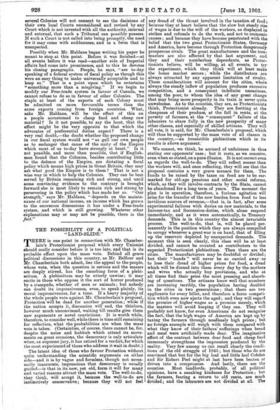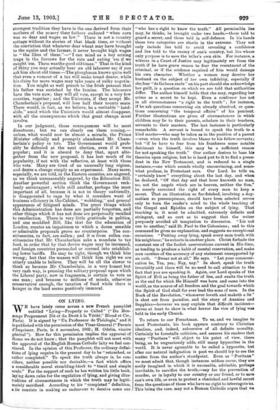THE POSSIBILITY OF A POLITICAL " LAND-SLIDE." T HERE is one
point in connection with Mr. Chamber- lain's Protectionist proposal which every Unionist should coolly consider before it is too late, and that is its probable effect upon the mass vote. Behind all grave political discussions in this country, as Mr. Balfour and Mr. Chamberlain both admit, lies the appeal to the people, whose vote, when the question is serious and the masses are deeply stirred, has the smashing force of a plebi- scitum. A plebiscitum may be utterly unwise ; it may excite in those who oppose it the sort of horror produced by a stampede, whether of men or animals ; but nobody can doubt its impressiveness, even, to speak plainly, its moral impressiveness, for a time. If a heavy majority of the whole people vote against Mr. Chamberlain's proposal,. Protection will be dead for another generation; while if the nation accepts it, discussion will end, the thinkers, however much unconvinced, waiting till results give them new arguments or novel convictions. It is worth while, therefore, to consider well, while there is time still remaining for reflection, what the probabilities are when the mass vote is taken. (Certainties, of course, there cannot be, for, despite the noise and hubbub which attend its move- ments on great occasions, the democracy is only articulate when, as supreme jury, it has retired for a verdict, for which the most experienced of those who address it wait in doubt.) The latent idea of those who favour Protection without quite understanding the scientific arguments on either side—and it is by vague and formless, though not neces- sarily inaccurate, impressions that democracy is usually guided—is that in its new, yet old, form it will for many and varied reasons attract the mass vote. The well-to-do, they think, will accept it, because the well-to-do are instinctively conservative; because they will not feel any dread of the threat involved in the taxation of food; because they at heart believe that the slow but steady rise of wages is due to the will of the workers, as displayed in strikes and refusals to do the work, and not to economic causes ; and because they have become penetrated with the belief that the two great Protectionist States, Germany and America, have become through Protection dangerously prosperous rivals. The great manufacturers and the iron- masters are also affected by that last argument, and they and their numberless dependants, as Protec. tionists believe, will be willing, at all events, to try the experiment, which they think will at least make the home market secure ; while the distributors are always attracted by any apparent limitation of rivalry. Those considerations will account for the cities, where always the steady inflow of population produces excessive competition, and a consequent indefinite uneasiness, among the poor, to whom the idea of any great change that may bring more prosperity in its train is never quite unwelcome. As to the counties, they are, as Protectionists think, Protectionist already. They are fretting at the cheapness of their produce, at the fall in rents, at the poverty of farmers, at the " consequent" failure of the labourers to share fully in the new prosperity of many other classes, and especially of skilled artisans. They will all vote, it is said, for Mr. Chamberlain's proposal, which will thus be supported by the mass vote of all classes in the country,—an irresistible plebiscitum which in its results is above argument.
We cannot, we think, be accused of unfairness in thus stating our opponents' case ; but it rests, as we conceive, even when so stated, on a pure illusion. It is not correct even as regards the well-to-do. They will reflect sooner than the workers will, and once reflecting, they will see that the proposal contains a very grave menace for them. The funds to be raised by the taxes on food are to be ear- marked for old-age pensions and other social reforms, which, as they will involve contracts by the State, cannot be abandoned for a long term of years. The moment the plan is in operation, therefore, a furious agitation will arise for the transfer of the new burden from food to less invidious sources of revenue,—that is, in fact, after some experimental failures with duties on raw materials, to the Income-tax and Succession-duties, which alone respond immediately, and as it were automatically, to Treasury demands. This is in this country the almost invariable process. The well-to-do, that is, will be placed per- manently in the position which they are always compelled to occupy whenever a great war is on hand, that of filling up the reservoir depleted by unexpected demands. The moment this is seen clearly, this class will be at least divided, and cannot be counted as contributors to the expected Protectionist plebiscitum. Then there are the cities. The manufacturers may be doubtful or divided; but their " hands " will never be so carried away ,as to lose their dread of higher prices for food, a dread which will be dinned into them every day by the mothers and wives who actually buy provisions, and who at all times find their price the most pressing and absorb. ing of questions. The artisans know well that numbers are increasing terribly, the population having doubled in the cities in two generations ; that there are two applicants for every billet, and therefore a fierce competi- tion which even now ejects the aged; and they will regard the promise of higher wages as a promise merely, which the masters will avoid keeping if they can. They will probably not know, for even Americans do not recognise the fact, that the high wages of America are kept up by taxing the farmers through needlessly high prices ; but no foreign example will weigh with them compared with what they know of their fathers' sufferings when bread and meat were artificially made dear. The imaginative effect of the contrast between dear food and cheap food immensely strengthens the impression produced by the reality. Very few among us can recall clearly the condi tions of the old struggle of 1845 ; but those who do are convinced that but for the big loaf and little loaf Cobden and Sir Robert Peel might at last have been beaten or driven into a compromise. And lastly, there are the counties. Most landlords, probably, of all political opinions, have a sneaking kindness for Protection ; but the farmers, fearing a return to old rents, are much divided; and the labourers are not divided at all. The
strongest tradition they have is the one derived from their mothers of the misery their fathers endured " when corn was so dear and wages so low." There is not a country cottage without its stories of that black time, or without the conviction that whatever dear wheat may have brought to the squire and the farmer, it never brought high wages to " the likes of them."—" I can mind as a boy setting traps in the furrows for the rats and eating 'em if we caught 'em. Them was the good old times." That is the kind of thing you may actually hear an old labourer say if you ask him about old times.—The ploughman knows quite well that even a rumour of a tax will make bread dearer, while his claim for more wages may take years of sulky negotia- tion. You might as well preach to the Irish peasant that his father was enriched by the famine. The labourers have the vote now; they will all vote, except in a very few counties, together ; and the Unionists, if they accept Mr. Chamberlain's proposal, will lose half their county seats. There would, in fact, as we believe, be a veritable " land- slide," amid which the Unionists would almost disappear, with all the consequences which that great change must involve.
In our judgment, those consequences will bo most disastrous ; but we can clearly see them coming,— unless, what would now be almost a miracle, the Prime Minister officially and promptly abandoned Mr. Cham- berlain's policy in tote. The Government would prob- ably be defeated at the next election, even if it were popular; and it is absurd to deny that, apart alto- gether from the new proposal, it has lost much of its popularity, if not with the reflective, at least with those who vote. Many are tired of an unusually long regime, and desire a change simply as an experiment. Many more, especially, we are told, in the Eastern counties, are angered, as we think unreasonably angered, by the Education Bill. Another powerful section think the Government reck- lessly extravagant ; while still another, perhaps the most important of all, because it is not in theory unfriendly. is disappointed to rage by what it considers want of business efficiency in the Cabinet, " wobbling," and general appearance of fatigued minds. The great things which this Administration has done are partially forgotten, and other things which it has not done are perpetually recalled to recollection. There is very little gratitude in politics, and one muddled Bill, like that for the education of London, creates an impatience to which a dozen sensible or admirable proposals prove no counterpoise. The con- stituencies, in fact, are sullen ; and it is from sullen con- stituencies that Mr. Chamberlain asks a mandate to tax food, in order that by that device wages may be increased, and foreign countries persuaded or coerced into establish- ing lower tariffs. He may be right, though, we think him wrong; but that the masses will think him right we are utterly unable to believe. They will be all the slower to think so because Mr. Chamberlain, in a very honest but very rash way, is pressing the solitary proposal upon which the Liberal party, now in fragments, is certain to vote as one man ; and because to millions of minds, otherwise conservative enough, the taxation of food while there is hunger_ in the land seems positively immoral.











































 Previous page
Previous page